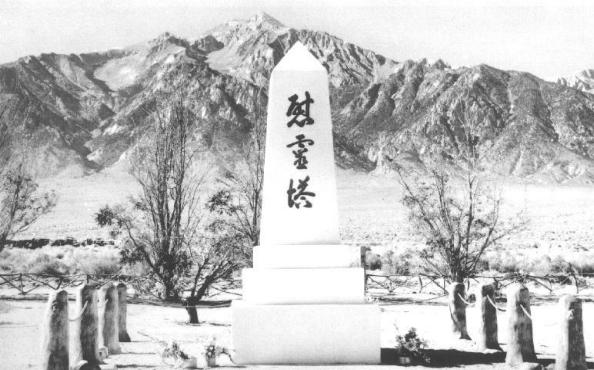Main Menu-The Manzanar Project The Meaning of Manzanar Came those relocation orders, they took our house, the store, the carAnd they drove us through the desert to a place called Manzanar The Spanish word for apple orchard though we saw no apple trees Just the rows of prison barracks with barbed wire boundaries We dreamed of apple blossoms waving free beneath the stars. From Manzanar by Tom Russell, Hightone Records
MANZANAR means "apple orchard" in Spanish. It was they who in the 18th century named this area of the Owens Valley in California that was to remain a natural fertile tract until 1919, when the water supply for the valley was diverted into a huge aqueduct to nurture the growth of Los Angeles. From that time on, it became a sparsely inhabited crossroads at the foot of the rugged eastern Sierra.
From one who experienced the camp comes an effort to create a proud though bittersweet remembrance, to further memorialize the Japanese Americans and their hardships in a way that is appropriate to their character. The project, which he named MANZANAR, was begun by Dr. Gordon Sato at the Salton Sea in California and is a search for answers to the problem of world hunger through the use of salt water agriculture. It is one that if successful will allow indigenous peoples who are facing famine and who live on coastal desert areas to feed themselves, but more importantly build a self-sufficient economy with available resources. Most exciting are the preliminary results that suggest that rationale man-made approaches to application in large scale using biological principles, salt water desert agriculture has the potential to compensate for de-forestation in tropical areas of the world that may have global consequences. © 1998-2013, Wallace L. McKeehan, All Rights Reserved |

 (Photo: A 2 year old
American waves goodbye to home in LA on the way to Manzanar, 1942. From USC Regional
History Center Collection) In 1942, on this site, the United States Government, as
the result of an ominous series of "Civilian Exclusion Orders", established
resettlement camps which would deny property and liberty to American citizens of Japanese
descent. Some of these detainees would spend up to four years interned in this and other
similar barren isolated concentration camps. To speak of MANZANAR is to evoke a feeling of
sadness.
(Photo: A 2 year old
American waves goodbye to home in LA on the way to Manzanar, 1942. From USC Regional
History Center Collection) In 1942, on this site, the United States Government, as
the result of an ominous series of "Civilian Exclusion Orders", established
resettlement camps which would deny property and liberty to American citizens of Japanese
descent. Some of these detainees would spend up to four years interned in this and other
similar barren isolated concentration camps. To speak of MANZANAR is to evoke a feeling of
sadness.